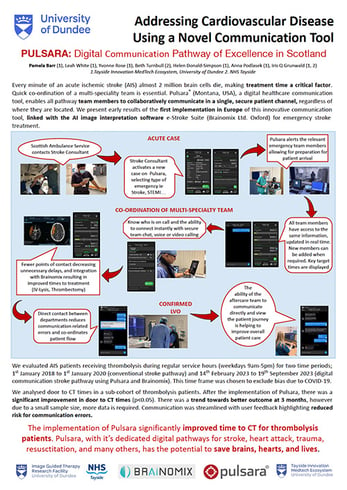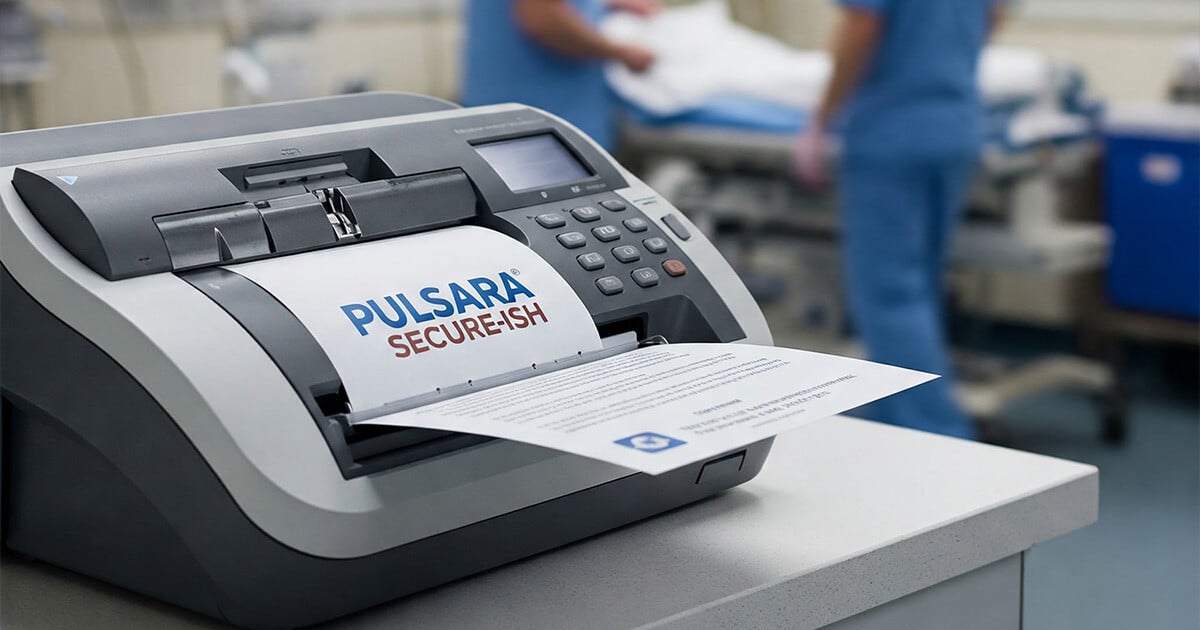Baker to Vegas: Leveraging Pulsara to Manage a Planned Event
Although they have the advantage of prior awareness and preparation, large-scale planned events pose unique challenges for emergency management...
2 min read
 Team Pulsara
:
Dec 06, 2023
Team Pulsara
:
Dec 06, 2023

Initial data shows improvement in door-to-CT times for thrombolysis patients
Earlier this year, the University of Dundee, Scotland became the first facility in Europe to implement Pulsara. In combination with radiology AI solution Brainomix, the University began using Pulsara to improve patient care and enhance communication around stroke patients. According to a recently approved abstract submission to the Scottish Heart & Arterial Disease Risk Prevention (SHARP) released by the University entitled “Addressing Cardiovascular Disease Using a Novel Communication Tool Pulsara: Digital Communication Pathway of Excellence in Scotland,” the implementation of Pulsara has significantly improved patient care in several areas, including improved door-to-CT times and a reduced risk of communication errors.
As one of the UK’s leading public research universities, The University of Dundee, Scotland is recognized worldwide for its expertise across multiple disciplines including art, science, engineering, and medicine. The University has been awarded “Scottish University of The Year” and named top university for teaching excellence in Scotland by Sunday Times University Guide. The University of Dundee Medical School is also connected to the UK’s three most-cited scientists, and the majority of the medical institute’s research is of national or international distinction.
 This dedication to excellence led the University to Pulsara, the leading mobile telehealth, communication, and logistics platform that unites health care teams and technologies across organizations during dynamic events. As time to treatment is a critical factor in acute ischemic stroke cases, the University’s School of Medicine Neuroradiology Chair, Professor Iris Grunwald—a clinician, researcher, and co-founder of Brainomix—recognized Pulsara’s potential for improving and streamlining stroke patient care. In coordination with NHS Tayside and Ninewells Hospital, the University of Dundee began using Pulsara and Brainomix on February 14th, 2023, and concluded gathering data for evaluation on September 19th, 2023. "We analysed door to CT times in a sub-cohort of thrombolysis patients,” the abstract reported. “After the implementation of Pulsara, there was a significant improvement in door to CT times (p<0.05). There was a trend towards better outcome at 3 months, however due to a small sample size, more data is required.”
This dedication to excellence led the University to Pulsara, the leading mobile telehealth, communication, and logistics platform that unites health care teams and technologies across organizations during dynamic events. As time to treatment is a critical factor in acute ischemic stroke cases, the University’s School of Medicine Neuroradiology Chair, Professor Iris Grunwald—a clinician, researcher, and co-founder of Brainomix—recognized Pulsara’s potential for improving and streamlining stroke patient care. In coordination with NHS Tayside and Ninewells Hospital, the University of Dundee began using Pulsara and Brainomix on February 14th, 2023, and concluded gathering data for evaluation on September 19th, 2023. "We analysed door to CT times in a sub-cohort of thrombolysis patients,” the abstract reported. “After the implementation of Pulsara, there was a significant improvement in door to CT times (p<0.05). There was a trend towards better outcome at 3 months, however due to a small sample size, more data is required.”
Communication and collaboration were also improved with Pulsara. “Direct contact between departments reduces communication related errors and co-ordinates patient flow,” the abstract reported. “The ability of the aftercare team to communicate directly and view the patient journey is helping to improve overall patient care.” The abstract also found that “Communication was streamlined with user feedback highlighting reduced risk for communication errors."
Also illustrated in the new abstract is the University’s workflow for stroke patients using Pulsara and Brainomix. Once the Scottish Ambulance Service contacts the Stroke Consultant about an acute stroke case, the "Stroke Consultant activates a new case on Pulsara, selecting type of emergency, i.e., Stroke, STEMI. Pulsara alerts the relevant emergency team members allowing for preparation for patient arrival. All team members have access to the same information, updated in real time. New members can be added when required. Key target times are displayed." Utilizing Pulsara’s team chat, voice, or video calling, all teams can seamlessly coordinate together around the patient case in one secure patient channel.
Pulsara also integrates with Oxford-based Brainomix, a radiology AI solution that leverages their state-of-the-art AI algorithms to support clinical analysis. The company’s comprehensive stroke imaging technology, e-Stroke, provides real-time interpretation of brain scans to help guide treatment and transfer decisions for stroke patients.
With the Pulsara-Brainomix integration, clinicians can share and receive more detailed stroke patient information along the whole care continuum, enabling faster and more efficient care. The University of Dundee abstract observed that the Pulsara-Brainomix integration enabled “fewer points of contact [which decreased] unnecessary delays” and the “integration with Brainomix [resulted] in improved times to treatment (IV-Lysis, Thrombectomy).”
The abstract concluded that "The implementation of Pulsara significantly improved time to CT for thrombolysis patients” and recognized the platform’s capability beyond stroke care—to any patient event and every method of arrival. “Pulsara, with its dedicated digital pathways for stroke, heart attack, trauma, resuscitation, and many others, has the potential to save brains, hearts, and lives."
View the University of Dundee's abstract here.
![]()
The Journal of Evaluation in Clinical Practice recently published a study on the process of implementing Pulsara across multiple healthcare organizations and hospital departments. Check out the study here.

Although they have the advantage of prior awareness and preparation, large-scale planned events pose unique challenges for emergency management...

For Those Who Love a Good "Oopsie!" At Pulsara, we pride ourselves on enabling secure, HIPAA-compliant communication for healthcare teams. But let’s...

March Recap A New Integration: Improving Data Management, Streamlining Workflows, and Improving Care CoordinationOnly a few days ago, we announced...